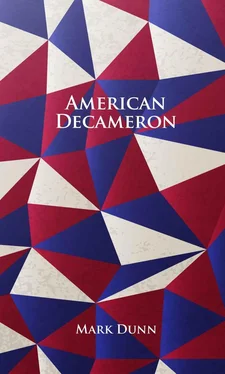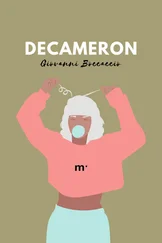As Gail and Ericka were waiting for the assembling of all of the centenarians (in company with their respective retinues), Gail turned to her companion and whispered, “Lucinda — that girl there who wants to have us all ‘shot’—she was telling me the other day about being nearly kidnapped by a pervert in a mall in Waukegan, when she was no more than five. I have come to the conclusion, Ericka, that life is a perilous journey no matter who you are. There are some, like myself, who walk the tightrope and do aerial loop-the-loops to impress the crowds — those who add a layer of additional risk to their lives— we constitute a special category and sometimes we get lucky. My good Lord, I’m one hundred years old. I’ve looked death in the face more times than I can remember, yet here I am!
“But for everyone else, luck plays its part as well. Catherine was lucky to survive what she went through; so many who boarded that boat with her did not. Dorothy, who lives down the hall, survived the sinking of the Lusitania when she was just a little girl. And Angeline — poor Angeline’s face was slashed by her demented father at nearly the same age, but her marriage to her beloved Jake has lasted sixty years. Although, there are so many others I know who have been dealt equally unfortunate hands who did not survive, did not prevail.
“Do you see Alma there? Doesn’t she look exotic in that blueberry-colored gypsy peasant dress her granddaughter Connie got her from the vintage clothing store? Connie’s a dear. She’s taking over the kitchen and making us linguine tonight — she uses lots of oregano. Alma’s brother was shot by his lieutenant for not going ‘over the top’ in the first World War. Shot pointblank right there in the trenches. Lily Lanham — see her there in the pretty red hat? — Lily’s nephew Todd was accidentally pushed off a balcony in a Chicago movie theatre when an usher tried to get him to go home; the young man seemed determined to watch every single screening of The Harvey Girls . You know, the one with the song about the Atchison, Topeka, and the Santa Fe? And Amelia Bream’s sister Vanessa — Amelia’s the handsome woman sitting next to Joanna in the big wool sweater — Vanessa broke her neck in a jitterbug competition back in ’39, when she slipped from her partner’s arms in an over-the-head throw and had to spend the rest of her life paralyzed from the neck down.”
“I was almost devoured by hyenas on my trip to Africa last year,” contributed Ericka, almost proudly.
“Yes, I remember you telling me that they invaded your camp one night and tried to get into your tent.”
Ericka cleared her throat. “That’s right.”
Ericka was asked by the photographer to step back. His name was Dack and he wore a deerstalker cap he’d inherited from a favorite great uncle — a Michigan man. Dack was from Wisconsin but had spent most of the last thirty years living in Greenwich in a house he’d bought from an ad man, a Bataan survivor, who’d had the Neocolonial custom-built a few years after the war. The Gold Coast remained very popular with New York “Mad Men.” One of Dack’s neighbors was a Young and Rubicam account executive named Stewart Selman, who made headlines for himself and his agency in 1970 by putting together a midi-skirt ad campaign for New York clothier Bonwit Teller that depicted iconic Americans of the twentieth century (all men!) wearing midi-skirts: Louis Armstrong, the Wright Brothers, Harold Lloyd (hanging from that detaching skyscraper clock wearing a paisley print mid-length), and even Louis B. Mayer, bedecked in a chartreuse calf-length and flanked by a conveniently delighted Mickey and Judy. Several years later, Selman won a Clio for a parody ad in which the gunslinger Shane is persuaded to return to the homesteading Starrett family (in the midst of his ride into the proverbial western sunset) for a bowl of “crispy, crunchy” Golden Grahams breakfast cereal.
After the photo shoot, as most of the centenarians were being returned to their rooms, Gail and Ericka went into one of the home’s intimate sitting rooms to speak in private. Gail said that she had something important she wanted to talk to Ericka about. There was a travel magazine on the sofa. Ericka moved it to the coffee table before sitting down. On its cover was a picture of the Golden Gate Bridge. Someone had prankishly penned in a little stick man taking a dive from it. Ericka set it down on top of another magazine — this one for senior citizens. The cover article was titled “Fifteen Reasons to Visit Flagstaff, Arizona.” Ericka wondered if one of the reasons was souvenirs; her great-aunt had bought her a Grand Canyon pennant at a gift shop in Flagstaff called Gertie’s. Ericka had added it to her growing collection of colorful place-pennants, most of them purchased by friends and relatives at Stuckey’s roadside stores.
Ericka liked the cozy little room. On the wall across from her was a print of Maxfield Parrish’s fantastical Daybreak ; on the wall behind her a print of van Gogh’s reticent “Vase with Poppies.” The radio in the room was tuned to a classical station. In honor of Memorial Day weekend, the station was playing works by American composers — at the moment, the first movement of Edward MacDowell’s Second Piano Concerto.
“Dear, there is something I’d like you to do for me. While the longevity of my roommate Catherine is something I might wish to aim for, I don’t believe for a minute that I’ll ever reach the age of 107. When I do die, be it this year or the next, I’d like you to take my cremains — is that the word? — take them down to New York and go to the top of whichever of the World Trade Center towers has the observation deck. I haven’t been there since right after they were built. And I want you to cast my ashes to the wind. You must make certain, dear, that the wind is blowing away from the building. What I’m asking you to do may very well be illegal, but then again, illegality hasn’t stopped me from doing a host of things in my life that I thought had value. I very nearly stowed away on the Akron when I was a much younger woman — in protest over the fact that women weren’t allowed to serve in any capacity on Uncle Sam’s rigid airships. How I envy you, Ericka — all the wonderful opportunities being afforded to women of your generation.”
“I’ll do that for you, Gail. I will.”
“Of course, my preference has always been to have my ashes taken to the top of Mount Everest, but that’s an impossibility, isn’t it? You don’t happen to know anyone who climbs that mountain on a regular basis, do you?”
“I’m afraid I don’t.”
“I never had children — wasn’t able to. I’ve met a lot of women over the years who weren’t able to bear children but were successful in making of their friendships something very much like family. My trouble is that all of my friends are dead. Except for you , Ericka. This is one of the drawbacks to living to be so old. Now, I take that back. I do have a couple of other younger friends besides you of whom I’m relatively fond. My friend Audrey in Austin, for example. And Nona in Marietta, Georgia. Nona’s a preschool teacher. And back in the twenties, so many, many years ago, I was good friends with a couple of Bohemian gals in Greenwich Village, Jenny and M.K., and there were the Cadwaladers — Wilberforce and Rosalinda — an older couple I knew in the thirties. She was a crosspatch but he was a dream. The cat’s meow, as we used to say. Of course, now I’m talking about people who are dead. I suppose I just made my earlier point, didn’t I?”
“Would you like me to take you back to your room now?”
“I am a little sleepy. I’m liable to nod off any minute now. Ginger, who lives across the hall from me, does that sometime. She’s from Iowa. Red Oak. Lost two brothers in the war. Poor unlucky woman, poor unlucky town . And Camilla doesn’t so much fall asleep as go into a kind of temporary catatonia. I think she’s reliving the death of her teenaged son back in Helena, Montana. He and another boy died in a terrible car crash one night.”
Читать дальше












